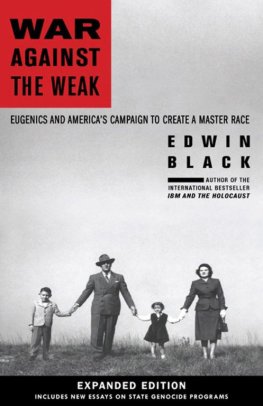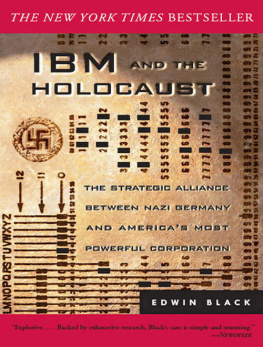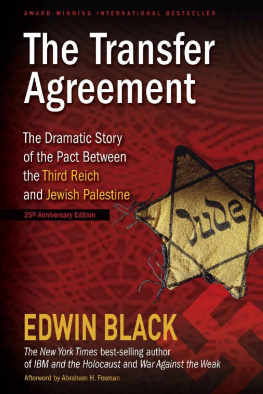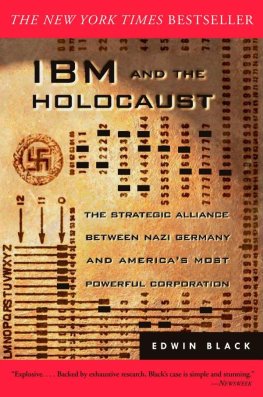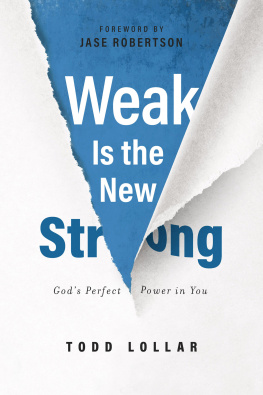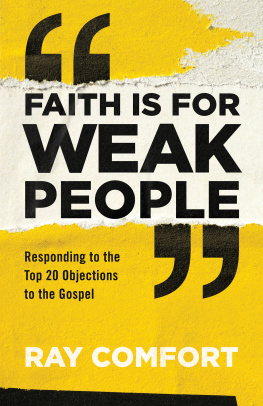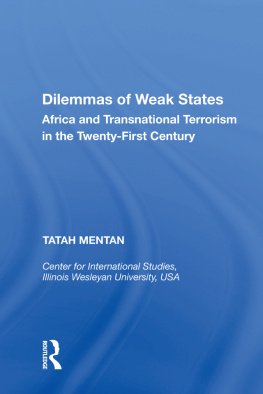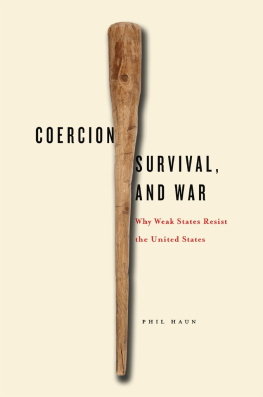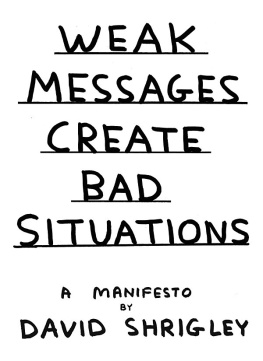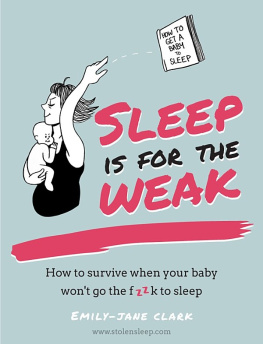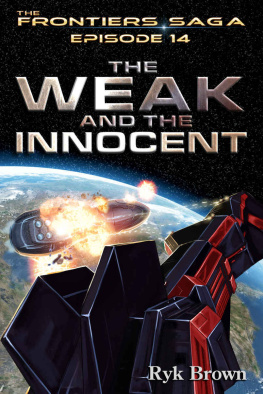Edwin Black - War Against the Weak
Here you can read online Edwin Black - War Against the Weak full text of the book (entire story) in english for free. Download pdf and epub, get meaning, cover and reviews about this ebook. City: Washington, DC, year: 2012, publisher: Dialog Press, genre: Science. Description of the work, (preface) as well as reviews are available. Best literature library LitArk.com created for fans of good reading and offers a wide selection of genres:
Romance novel
Science fiction
Adventure
Detective
Science
History
Home and family
Prose
Art
Politics
Computer
Non-fiction
Religion
Business
Children
Humor
Choose a favorite category and find really read worthwhile books. Enjoy immersion in the world of imagination, feel the emotions of the characters or learn something new for yourself, make an fascinating discovery.
- Book:War Against the Weak
- Author:
- Publisher:Dialog Press
- Genre:
- Year:2012
- City:Washington, DC
- ISBN:1-56858-258-7
- Rating:5 / 5
- Favourites:Add to favourites
- Your mark:
- 100
- 1
- 2
- 3
- 4
- 5
War Against the Weak: summary, description and annotation
We offer to read an annotation, description, summary or preface (depends on what the author of the book "War Against the Weak" wrote himself). If you haven't found the necessary information about the book — write in the comments, we will try to find it.
War Against the Weak — read online for free the complete book (whole text) full work
Below is the text of the book, divided by pages. System saving the place of the last page read, allows you to conveniently read the book "War Against the Weak" online for free, without having to search again every time where you left off. Put a bookmark, and you can go to the page where you finished reading at any time.
Font size:
Interval:
Bookmark:
Edwin Black
WAR AGAINST THE WEAK
Eugenics and Americas Campaign to Create a Master Race
Expanded Edition

Illustrations
Title page. Nazi eugenicist Ernst Rdin, president of the International Federation of Eugenic Organizations and director of the Kaiser Wilhelm Institute for Anthropology, Human Heredity, and Eugenics.
Dedication. Nazi eugenicist Dr. Otmar Freiherr von Verschuer examining the eyes of twins. His assistant, Josef Mengele, continued the experiments at Auschwitz.
Opposite Table of Contents. Nazi eugenicist Dr. Otmar Freiherr von Verschuer examining twins for height.
Part One. First Race Betterment Conference Banquet, held in Battle Creek, Michigan, in 1914.
Part Two. Imprisoned children following eugenic experiments at Auschwitz.
Part Three. Eugenics Record Office files.


Acknowledgments
Where do I begin to express gratitude, when so many people in so many places have lent so many hands to advance the cause of this years-long project? More than fifty researchers in fifteen cities in four countries, assisted by scores of archivists and librarians at more than one hundred institutions, combined to ingather and organize some 50,000 documents, together with hundreds of pages of translation, as well as to review hundreds of books and journals, all to collectively tear away the thickets of mystery surrounding the eugenics movement around the world. I cannot name all who need naming because of space limitations. In many cases, I do not even know them all. Many helped behind the scenes. But if great projects depend upon great efforts by a vast network, then War Against the Weak is greatly indebted indeed.
I must begin by thanking my corps of skilled researchers, mostly volunteers. Because the information needed for War Against the Weak resided in many out-of-the-way archives as well as major repositories, the challenge was to locate the right person in the right place at the right time, from the hilly back country of southern Virginia to Berlin. Recruits came from the Internet, organizational bulletin boards, word of mouth and my personal website, as well as the devoted research team involved with my previous books, IBM and the Holocaust and The Transfer Agreement. Some worked for a few days in a strategic location to extract vital information; others worked for months at a time in archives or my office.
Thanks are due to at least eight people in Germany, including Dennis Riffel, Christina Herkommer and Jakob Kort, who worked tirelessly in Berlin, Munich, Heidelberg, Koblenz and Munster at the archives and libraries of the Max Planck Institutes (successor to the Kaiser Wilhelm Institutes), Bundesarchiv, Heidelberg University, Mnster University, the Frei University and many other locations reviewing and summarizing thousands of pages. The laser-like ability of Riffel, Herkommer and their colleagues to identify connections spanning decades between Germans and Americans was indispensable.
In London, Jane Booth, Julie Utley, Diane Utley and several others spent months checking numberless documents, reviewing pamphlets and squinting at microfiche at the Public Record Office, Wellcome Library, University College of London Archives, British Library, Cambridge and other repositories to uncover links across the Atlantic.
In New York, more than a dozen researchers including Max Gross assisted me at the New York Public Library, the archives of New York University, Columbia University, and the Planned Parenthood Foundation. In Virginia, Susan Fleming Cook, Bobby Holt and Aaron Crawford dug through special and restricted library collections, archives, little-known museums, courthouse and institutional records, as well as the files of the ACLU. In California I was assisted by Lorraine Ramsey who worked in Chico, Sacramento and the University of California at Berkeley; Joanne Goldberg at the archives of the Hoover Institution and Stanford University; and others.
No fewer than eight researchers, including Christopher Reynolds and David Keleti, spent long hours at the American Philosophical Society archives in Philadelphia, the countrys most precious eugenic resource. I owe a debt to Ashley and Jodie Hardesty who, among a team of four, scoured the valuable files of Vermont eugenicists, which in many cases were still waiting to be processed. At Truman State University in Kirksville, Missouri, I recruited a cadre of students to scrutinize thousands of pages of documents from the files of Harry Laughlin in the Pickler Memorial Library and its archive, and two of the most helpful were Benjamin Garrett and Courtney Carter. The project was also aided when attorney Charles Bradley volunteered to provide follow-up at the Rockefeller Archives.
Of special importance was Phyllis Bailey of Montreal, who labored at university libraries in Montreal, the Public Records of Vermont, the American Philosophical Society in Philadelphia, and the Rockefeller Archives in Sleepy Hollow, New York. Bailey drove from archive to archive displaying extraordinary research skill and keen intellectual understanding of the injustices she was investigating.
My Washington, D.C., research staff-about a dozen individuals-displayed unflagging tenacity in researching at numerous archives, analyzing and organizing thousands of documents, as well as delivering incomparable research and manuscript detail work. No research project could ask for more. Here I include Kate Hanna, who worked at the National Library of Medicine and the Library of Congress, and, wielding her uncanny memory could recall almost every line of thousands of pages of eugenics journals she reviewed. Once Kate even corrected the date on an archival photograph.
Paul Dwyer displayed a special acumen for locating obscure volumes at numerous libraries, including American University, Catholic University, George Washington University, George Mason University, the University of the District of Columbia and others; he was also among a team of a dozen that pored through record groups at the National Archives. Eve Jones searched files at the National Archives and the Carnegie Institution, and my own considerable archival holdings.
John Corrado, assisted by Eve Jones, led the four-person fact and footnote verification team whose chore it was to cross-examine every fact and bit of fact context and then create the documentation trail, footnote by footnote, folder by folder. Corrado is also an exceptional researcher. Often, as I pounded my keyboard, I would call out an obscure name from decades past; within moments, Corrado was able to report the details. He is a researchers researcher.
Corrado, Jones, Hanna and Dwyer were augmented and assisted by Patricia Montesinos, Alexandra Carderelli, Greg Greer, Eric Smith, Erica Ashton and several others. Numerous translators worked arduously and often with little notice; chief among them was Susan Steiner, and Karl Lampl also helped.
War Against the Weak could never have been completed without the exceptional cooperation ofliterally scores of archivists and librarians. Some archivists helped by producing as many as five thousand photocopies from a single institution, often making an exception to their copying regulations, and with special file and fact searches, as well as fellowship.
Font size:
Interval:
Bookmark:
Similar books «War Against the Weak»
Look at similar books to War Against the Weak. We have selected literature similar in name and meaning in the hope of providing readers with more options to find new, interesting, not yet read works.
Discussion, reviews of the book War Against the Weak and just readers' own opinions. Leave your comments, write what you think about the work, its meaning or the main characters. Specify what exactly you liked and what you didn't like, and why you think so.

